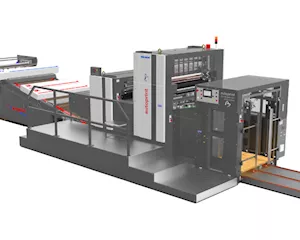Career and growth opportunities in publishing
Like any other industry, a job in the publishing industry involves a fair amount of competition and grunt work and requires bright go-getters who are not afraid of the grunt, says Monica Malhotra Kandhari, managing director, MBD Group.
18 Jul 2018 | By PrintWeek India
Publishing, defined broadly, means the activity associated with the preparation and dissemination of books, journals and other materials to the public. While pre-historic cave paintings and other countless innovations that took place over the years falls within this broad definition, publishing is generally associated with the production of printed works in the form of books, and eBooks in the post-modern era. From clay tablets to papyrus rolls, the industry has indeed come a long way. The development of writing systems, invention of paper and the invention of the movable type printing press by Johannes Gutenberg revolutionised printing and the publishing industry.
The underlying structure of the industry was, however, laid around mid-1500s when the model of acquiring copyrights, printing, distribution, selling and payment of royalty flourished in Europe and other countries.
Today, this model continues to be the basic principle for the industry. Publishing as an industry has many aspects to it. Writers, literary agents, illustrators, proof readers, copy editors, type setters, printers, binders, stockists, distributors, and marketers are all part of the industry with each playing a crucial role in the dissemination of printed works and supporting the industry.
The publishing industry offers multiple career options in the various aspects of the industry. Like any other industry, a job in the publishing industry involves a fair amount of competition and grunt work and requires bright go-getters who are not afraid of the grunt. Work in the publishing industry is fast paced and often requires the ability to manage expectations from various stakeholders such as editors, authors, and publicists with ease and efficiency.
There is much more to working in the publishing industry than being an editor. There are different roles in the industry that calls for varying skill sets. Aligning with personal interest and strengths play a critical role in gaining job satisfaction and hence in building a successful career. An editor for instance is in the business of finding budding talents, editing and molding a written work into the final product that is ready for the shelves. Similarly illustrators are responsible for designing accompany graphics and illustrations where required to make the final product informative as well as well designed to attract readers. The role of marketers and distributors is to highlight the salient points of the published work and publicity of the work to gain maximum traction in sales.
While publishing has been traditionally associated with printed books and materials, the advent of the digital era meant that a lot is happening in the digital realm. From eBooks to self-publishing over the internet, there has been a continuous onslaught on the publishing industry. While skeptics have been proved wrong regarding the impending demise of the industry, the digital era has presented the industry with new avenues for growth opportunities. Digital marketing, blogs, social media, podcasts and audio books are some examples of the new growth opportunities for the industry courtesy of the digital age.
Digitalisation and the increasing penetration of the internet have had a significant impact on the publishing industry. The entire value chain of the industry right from how books are published, distributed, sold and eventually consumed by the readers have undergone massive changes. Self-publishing, on demand printing and e-books are some of the mainstay of the industry today. A positive development out of all these developments is that today producing creative contents have become far easier with minimal cost and digitally distributing contents is cheap and reaches a wider audience as well.
The industry continues to face challenges from several quarters including digitisation, privacy and lack of skilled workers. At the same time the skill and competency required for a career in the publishing industry have also expanded to include proficiency in the internet, digital and even programming skills.
From online marketing to promotional activities through social networks and blogs publishers and marketers today needs to gain presence where the crowd is, they must find new and more effective ways to promote their titles to prospective readers.
So apart from being able to spot talent, proof read and edit written works to make it more attractive, a candidate today needs to be well versed with technology, designing, audio visual production and also needs to be able to navigate the world of social networking effectively.
A successful career in the industry requires a critical bent of mind, one that is analytical and passion for the job that borders on obsessive compulsion. Entry into the publishing industry is often through internship or an assistant role, and with hard work and experience one can expect to move into one of the more challenging roles to build a successful career.
A typical career progression in the industry looks like this — from an intern the next logical step is as a proof reader or editorial assistant. Then comes the position of development editor, project manager. An acquisitions editor or commissioning editor sits at the top of the value chain. Then, there are management roles such as publisher.
For a career in publishing a degree is desirable and the field of study is not a barrier unless one wants to specifically work in a specialised area of publishing such as art, law or science.
The publishing industry is one that is known for its long hours, crazy deadlines and variable job functions. From writing a pitch mail, press releases, putting together a media list, media pitching and follow-ups, coordinating with authors to draw up a publicity plan, scheduling interviews and media appearance. The work description also includes planning and implementation of marketing campaigns, writing blogs and managing social media channels. The job promises to be a challenging as well as satisfying experience for anyone willing to face the grunt.
Being a creative industry, jobs in publishing might not be everyone’s cup of tea nor will it suit everyone. A keen interest in the news, reading and the media in general. An inquisitive mind that is curious about how things work and the motivation to meet deadline and face challenges best describes the profile for an ideal candidate in the publishing industry.
A career in the industry offers its own set of perks and privileges which for the right candidate would be priceless, getting to read a variety of books and having the last word when it comes to deciding which ones merit publication. Moreover the chance to interact with celebrated authors and other celebrities or discovering the next literary sensation does not come with every job.














 See All
See All